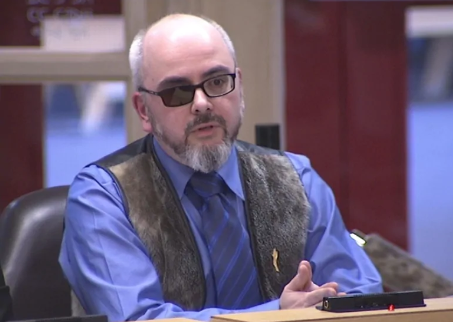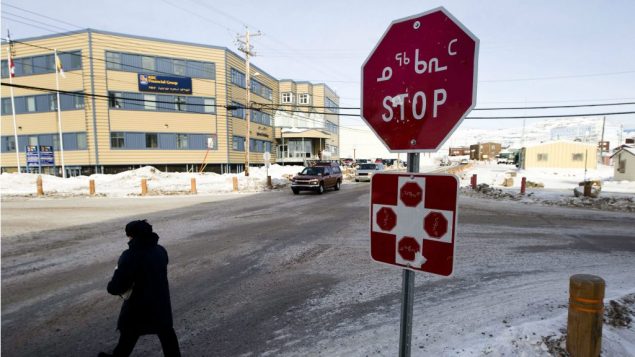Eye on the Arctic brings you stories and newsmakers from around the North
The United Nations has designated 2019 as the Year of Indigenous Languages.
The goal is to to make people more aware of the languages and their role in cultural preservation.
Throughout the year, Eye on the Arctic will be checking in with First Nations and Inuit communities across the North to talk policy, education and strategies for language preservation and promotion in their regions.
In this instalment, we turn the spotlight on Canada’s eastern Arctic territory of Nunavut in a conversation with Stephane Cloutier, the director of official languages at the Government of Nunavut’s Department of Culture and Heritage.
With Cloutier, we talk about the state of Inuktut, the term used in Nunavut to refer to the Inuit language dialects of the region, and why 2019 is an important milestone for language legislation in the territory.

Stephane Cloutier, Nunavut’s director of official languages, in an undated photo. (Nunavut Legislative Assembly)
Eye on the Arctic: 2019 has been designated by the United Nations as the year of Indigenous Languages, is there anything planned in Nunavut to mark the occasion?
Stéphane Cloutier: Nunavut is planning a big event that coincides with the International Year of Indigenous Languages. The Government of Nunavut, with its partners, will be hosting a big conference to mark 10 years since adopting the Nunavut language legislation, and to look at where we’re at in terms of language vitality of Inuktut in the territory. That conference will be called Inuugatta Inuktuuqta “Because we are Inuit, we must speak the language.”
What are some of the successes of the last 10 years in terms of the promotion and preservation of Inuktut?
There’s been important steps taken by government in order to improve the delivery of government services in Inuktut. There’s support provided to businesses and to municipalities as well. In terms of promoting the use of the language, especially revitalisation, we’ve been collaborating with Kitikmeot Region, where the language is more in decline. We’ve been implementing different projects, even using drum dancing as a safe environment to practice the culture but also the language.
We’ve also been promoting the language through music. Many people will know (Inuktut rock band) The Jerry Cans. But in the last three, four years, we’ve seen about 20 new albums recorded where artists from Nunavut are signing in Inuktut. This is something great that we did not see before. We’re also seeing more film productions or TV series using Inuktut.
Education is also a key to really support the language. In the last few years we’ve seen increased support for guided reading books in Inuktut for early grades up to grade five, and there are also plans for the following grades as well. This is a major initiative, we’re talking about close to 700 books that have been developed in the last few years just to support the learning of the language by youngsters.
What challenges remain?
We still see decline in language use either as a mother tongue, as a home language or knowledge of the language. We’re trying to do more research to better understand the reasons, the motivations and the barriers to language use or revitalization. There’s also a need for additional resources for the schools, especially more Inuit teachers and Inuit educators that can teach in the language. There are teacher training programs in place but we need to increase enrolment in some of those programs, so in Nunavut, we can one day teach all the way from kindergarten to grade 12 in the language.
There’s been discussions over the last decades about standardizing the Inuit language across Canada, or even one day, standardizing the language across the Arctic so Inuit in Russia, Alaska, Canada and Greenland would be able to share books and education materials. Where are these discussions now, and how important do you think it is as a long-term goal?
There’s been a lot of work done on this since 2010 when we had a big language summit in Nunavut. It was stepping stone at that time. Over the last 30 years, it was a very sensitive and delicate issue to discuss. But since 2010 people have been more open to discuss it. Nunavut’s Inuit language authority, Inuit Uqausinginnik Taiguusiliuqtiit, the body that sets orthography, terminology and usage has been conducting consultations in Nunavut with respect to a unified writing system. There’s also additional work being done at the national level by Inuit Tapiriit Kanatami, Canada’s national Inuit organization, about a national unified writing system for all Inuit regions.
This is not a resolved issue. It’s still ongoing. But there’s been a lot of work done.
Losing their Words, Eye on the Arctic’s 2010 documentary report on the debate around standardizing the Inuit language:
How would you sum up the state of Inuktut in Nunavut?
We’ve taken important steps in Nunavut to really recognize Inuktut as an official language on par with English and French. We’re very proud of that.
The revitalization and use of the language needs to be owned by people . So the language planning and initiatives are owned by the communities, the individuals and the families.
As a government we’re looking forward to 2019 and beyond to ensure that the language will thrive in the territory and in the future, for all Nunavummiut (the people living in Nunavut.)
The above Q&A has been edited and abridged.
For more from Eye on the Arctic‘s conversation with Stéphane Cloutier, listen here:
Write to Eilís Quinn at eilis.quinn(at)cbc.ca
Related stories from around the North:
Canada: With one word a day, this man is teaching the world how to speak Inuktitut, CBC News
Finland: Budget cuts threaten international Sámi language cooperation, Yle News
Greenland: `Enough of this postcolonial sh#%’ – An interview with Greenlandic author Niviaq Korneliussen, Eye on the Arctic
Iceland: Can environmental diplomacy save Arctic languages?, Blog by Takeshi Kaji
United States: Alaskan Inuit dialect added to Facebook’s Translate app, CBC News








For reasons beyond our control, and for an undetermined period of time, our comment section is now closed. However, our social networks remain open to your contributions.